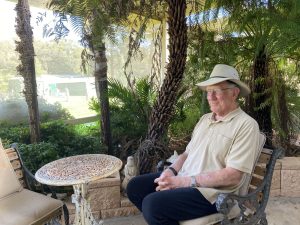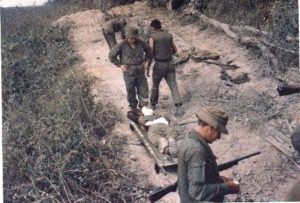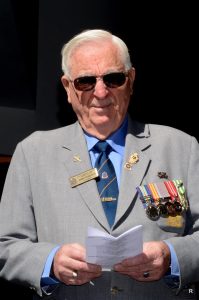Anzac Day holds a place in the hearts and minds of many, serving as a reminder of the courage, sacrifice, and resilience of the men and women who have served their country. This solemn day commemorates all Australians and New Zealanders who served and died in all wars, conflicts, and peacekeeping operations. The enduring spirit of the ANZACs is a legacy that continues to inspire generations.
Meet Geoffrey, John & Valerie:
Geoffrey served in the armed forces during the Vietnam War. Based in Saigon, Geoffrey was in the first battalion during the Battle of Coral-Balmoral.
John joined the army in 1968 and served as an Armoured Personnel Carrier Driver during the Vietnam War.
Valerie served in the Women’s Royal Australian Naval Service (WRANS), then she met and married her husband, who was a mechanical engineer for the Navy.
What was it like growing up?
Geoffrey: I grew up on a 640-acre dairy farm – we had a phone on the wall that you used to pick the receiver up and turn the handle!
It was completely different – a different world.
John: It’s very bloody different. We never had mobile phones and never had computers when I was growing up.
Valerie: I was born at the start of WW2; my dad was then a boatman, later becoming a coxswain on a Pilot Boat directing shipping into a QLD harbour. We lived on an offshore island with a lighthouse.
What does Anzac Day mean to you personally?
Geoffrey: Everything – the most important day of the year.
John: Australians, regardless of what colour, what race or who you are, should respect the guys who went and fought to save this country. The ones who put their lives on the line to make the country a better place than what it was.
Valerie: ANZAC day means more to me now, naturally, because I served 3 years in the WRANS and met and married my husband (a Mechanical Engineer in the Navy), so it is part of that background. In those days, women did not serve offshore and had to leave the service when they married.
After 10 years of service, my husband deployed and tried to enter ‘ordinary’ life but ended up working back with the Navy in a civilian capacity at various establishments in Sydney. So, ANZAC Day and Remembrance Day in November have since then been high on our calendar. I joined the same sub-branch in 2011, after his passing, because I felt safe there; it is like family, and all my help as a widow came from there; I am still as involved as I am able, although my voluntary work has had to almost cease because of age and mobility.
How do you like to commemorate?
Geoffrey: Well, I’m a veteran and down the road, there’s a little town called Picton and they have a march there and a service, and the little club puts on a breakfast. Sometimes my son comes down, sometimes with family or just him and I, and we find a club open and go out for dinner.
That’s what I do – the most important day of the year.
John: I go to the march when I can. I haven’t been able to go because of my health and that – but I’m going this year, I haven’t been since 2015, but I got my nephew coming up from Melbourne, and he’s going to push me in the wheelchair for my local RSL.
Valerie: Since 1966 when we married, ANZAC day for me has been Dawn Service in our local Park or at an adjacent suburb, assorted ceremonies at our local Club, a “smoko” (service talk for lunch or dinner) the week before to commemorate.
During this time every year, part of my volunteer work was to sell badges at the Club and on a day nominated by the Station Master, at peak time, at the Railway Station.
During the COVID lockdown, my family and I did a short vigil outside our fence, as did lots of other families; it was “special” and lovely. My son and daughter and their families respect this time and understand, and still take me to The Dawn Service.
What should younger generations know about Anzac Day?
Geoffrey: They should be taught the truth.
John: They should respect, be taught and be shown what people have done, the men, and women that saved their country – it wouldn’t be the same country it is today.
Valerie: On a couple of occasions when my husband was President of our local sub-branch, I joined him when he visited a couple of local schools prior to Anzac Day to speak to the children. I found these Primary school age children are very interested and ask very interesting and sometimes, funny questions. Our current President still does this each year. The children are thirsty for knowledge. The schools involved ask for this to be done each year.
Do you have anything to add?
Geoffrey: Recommends watching the movie “One Child”, which brought back some special memories of his time in the Armed Forces he had long forgotten.
“It’s a very emotional movie. Don’t be afraid to have a box of tissues beside you. It is a beautiful movie”.
In 2024, it will be the 56th anniversary of the Battle of Coral-Balmoral.

(Pictured: Geoffrey sitting outside)
John: In 1970, John was seriously wounded after driving over an anti-tank mine. John spent the next year in and out of the repatriation hospital before being posted back to his unit (3 CAV) at the Cavalry.
 .
. 
(Pictured: Left – 1970, John on stretcher. Right – John at armed forces event)
Valerie: *Speaking of her late husband* He loved his time in the Navy, his mates, his comrades, he was proud of that time, not regretful or complaining.
Valerie has worked closely with the Australian charity Legacy for many years. To learn more about their impact and how they support the partners and children of veterans, please visit the Legacy website here.
We thank Geoffrey, John and Valerie for taking the time to talk to us about what Anzac Day means to them and for their service to our country.
To learn more about Veteran Home Care services with HenderCare, click here.

